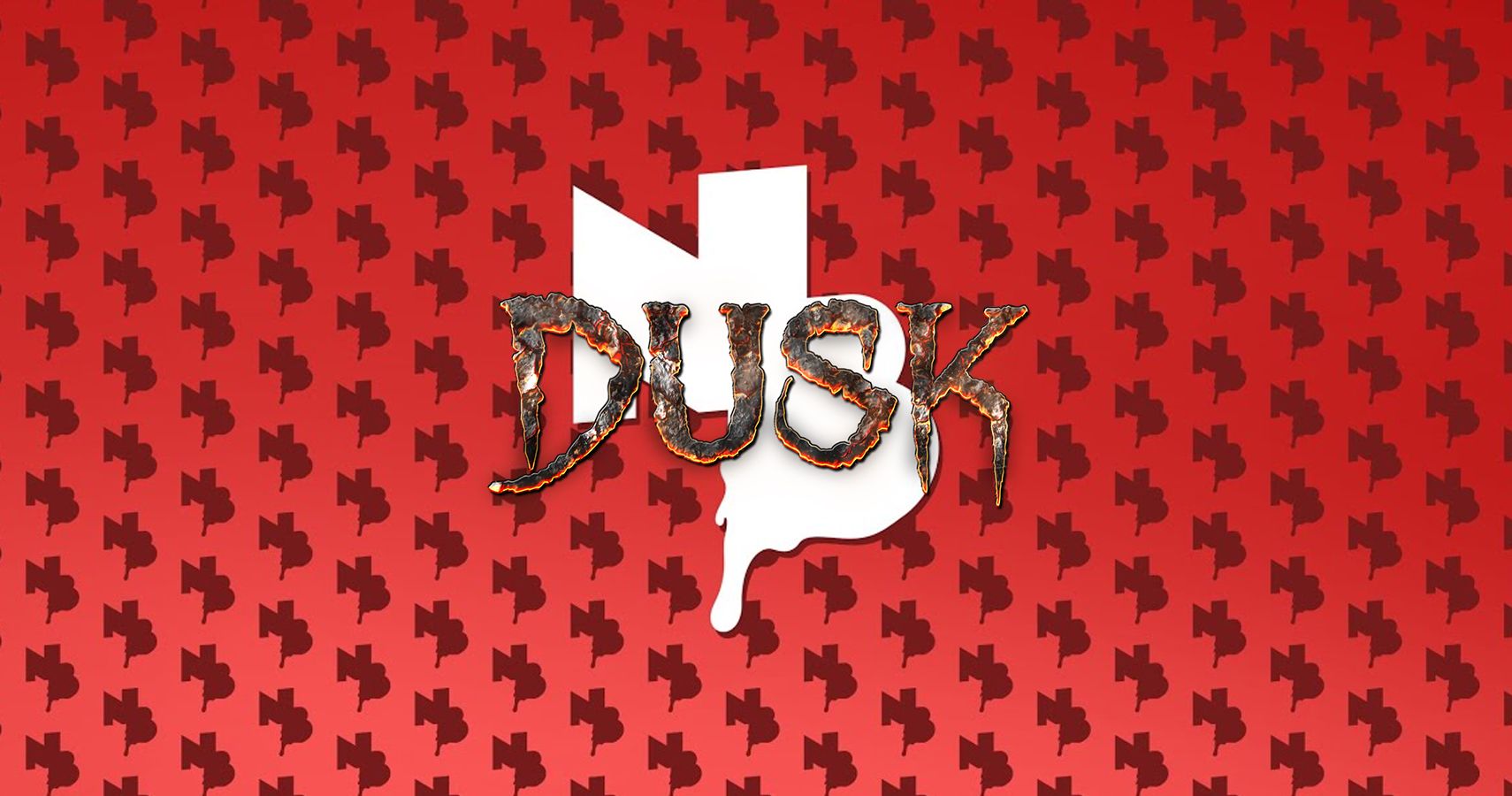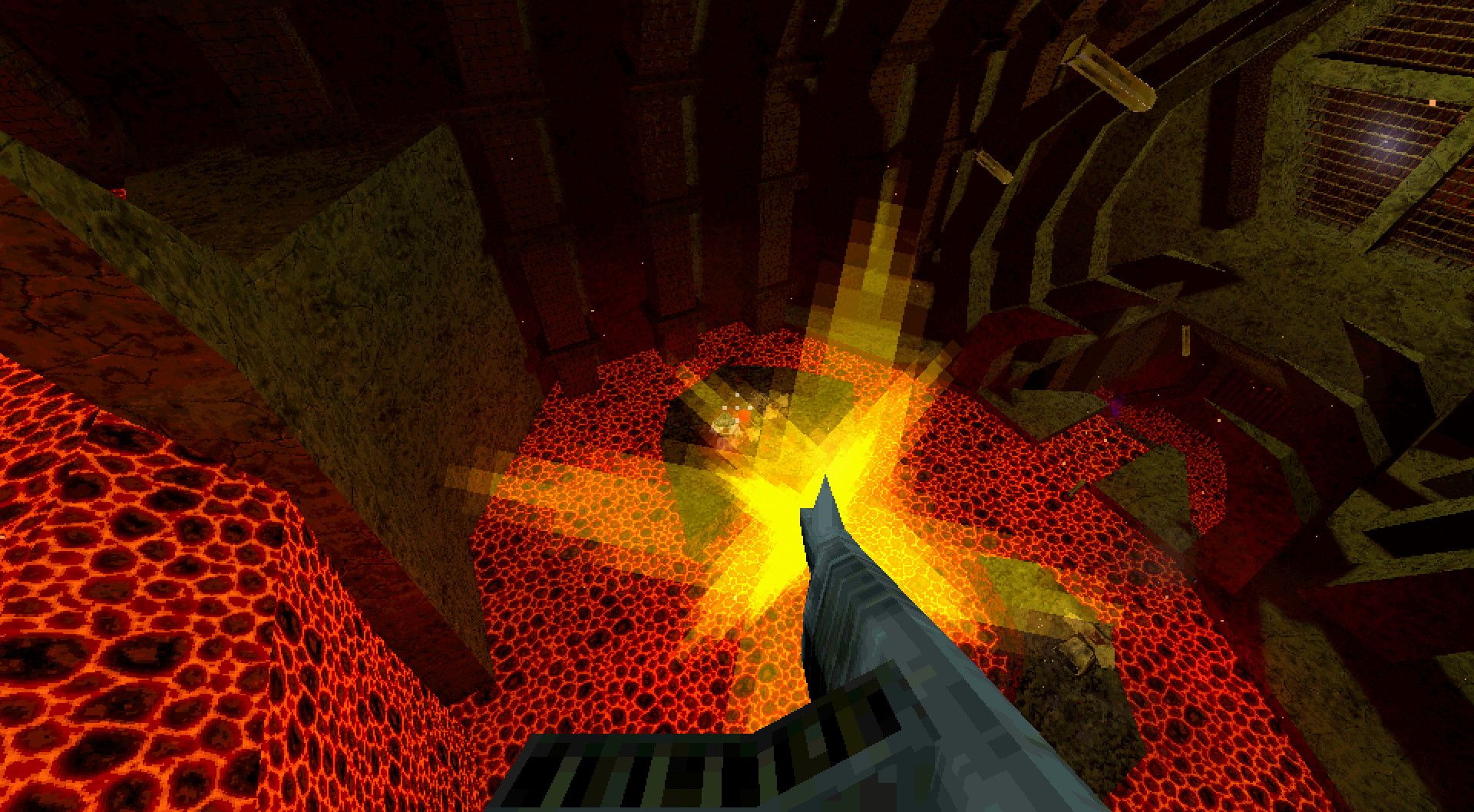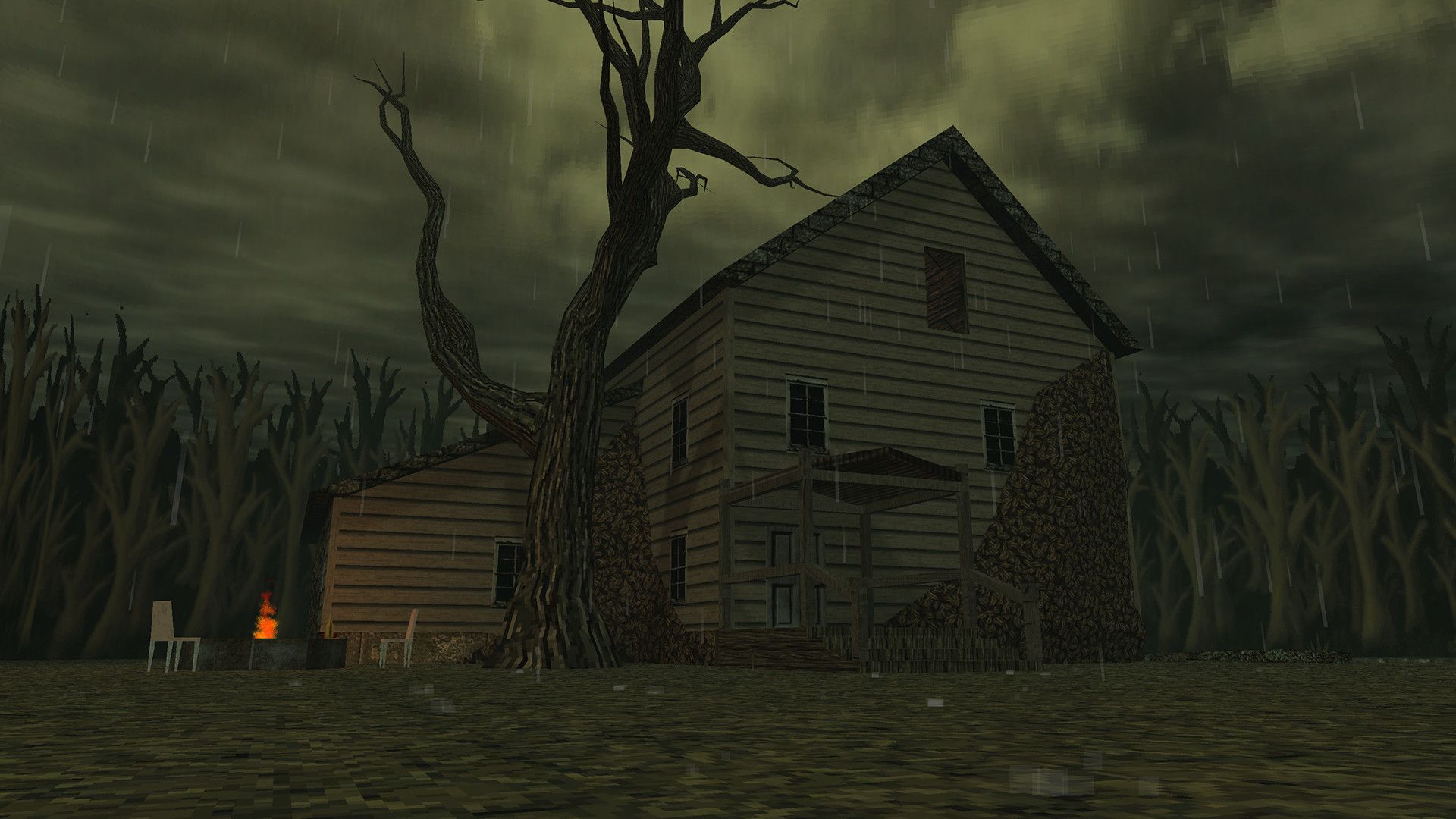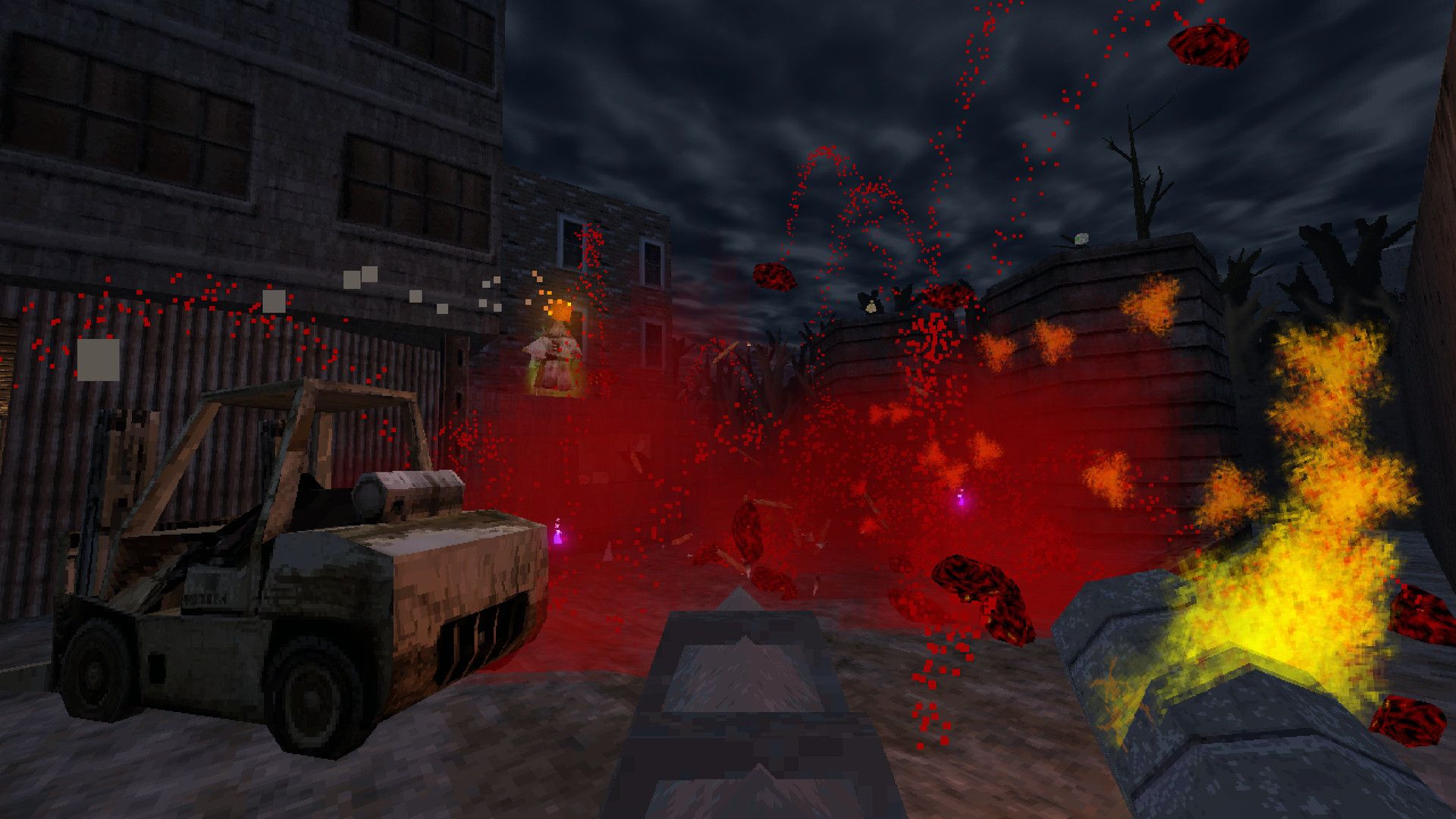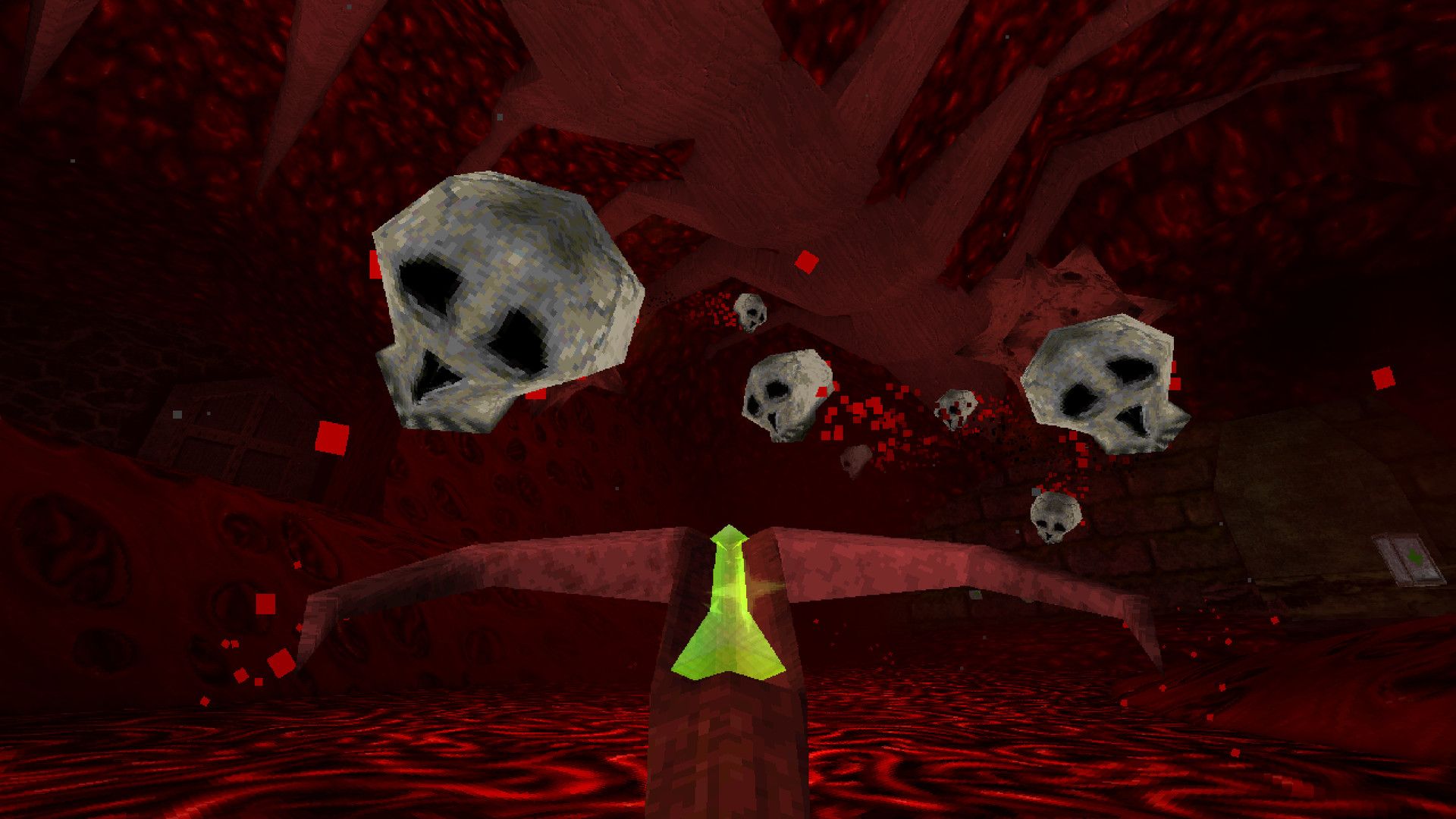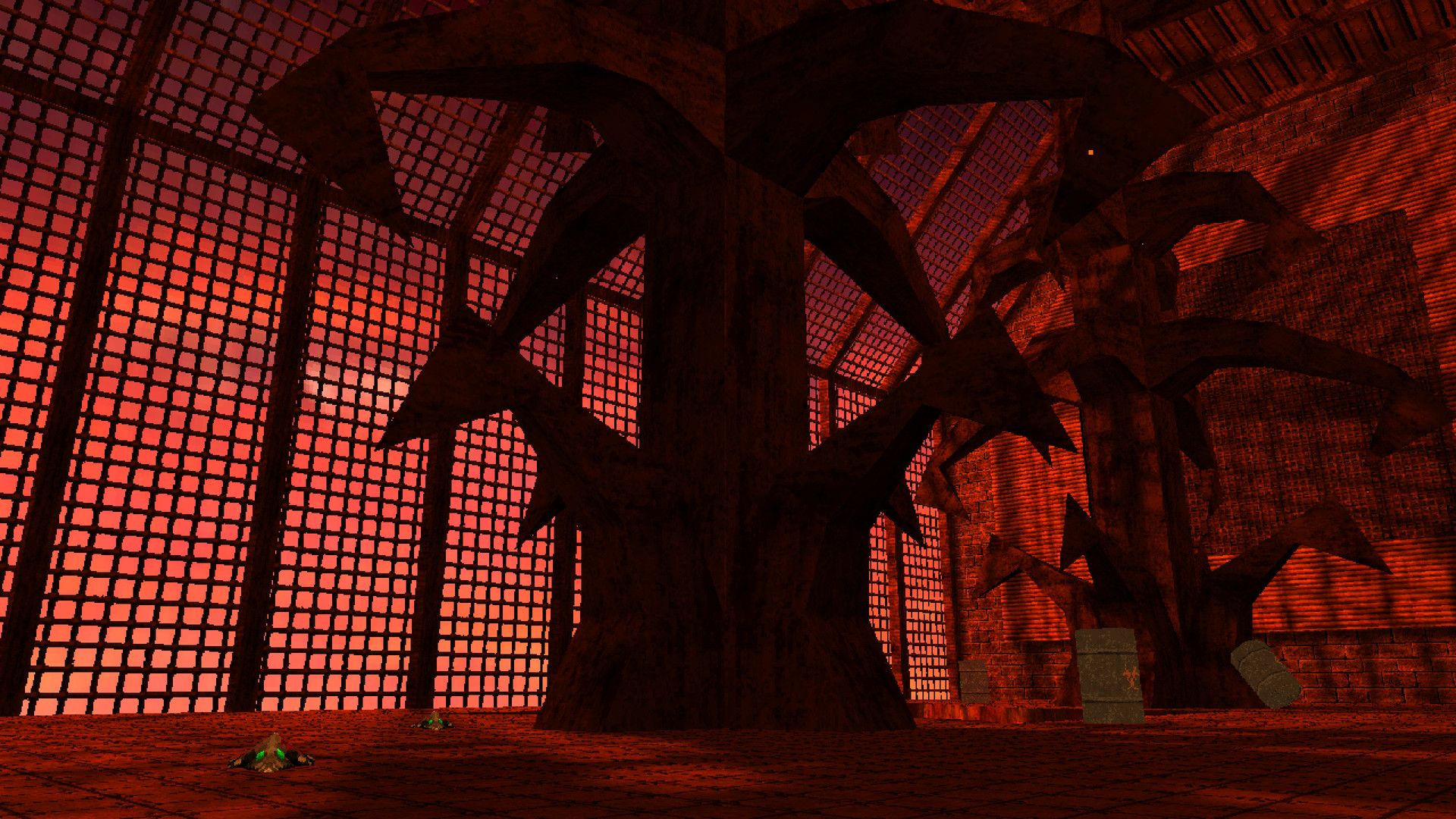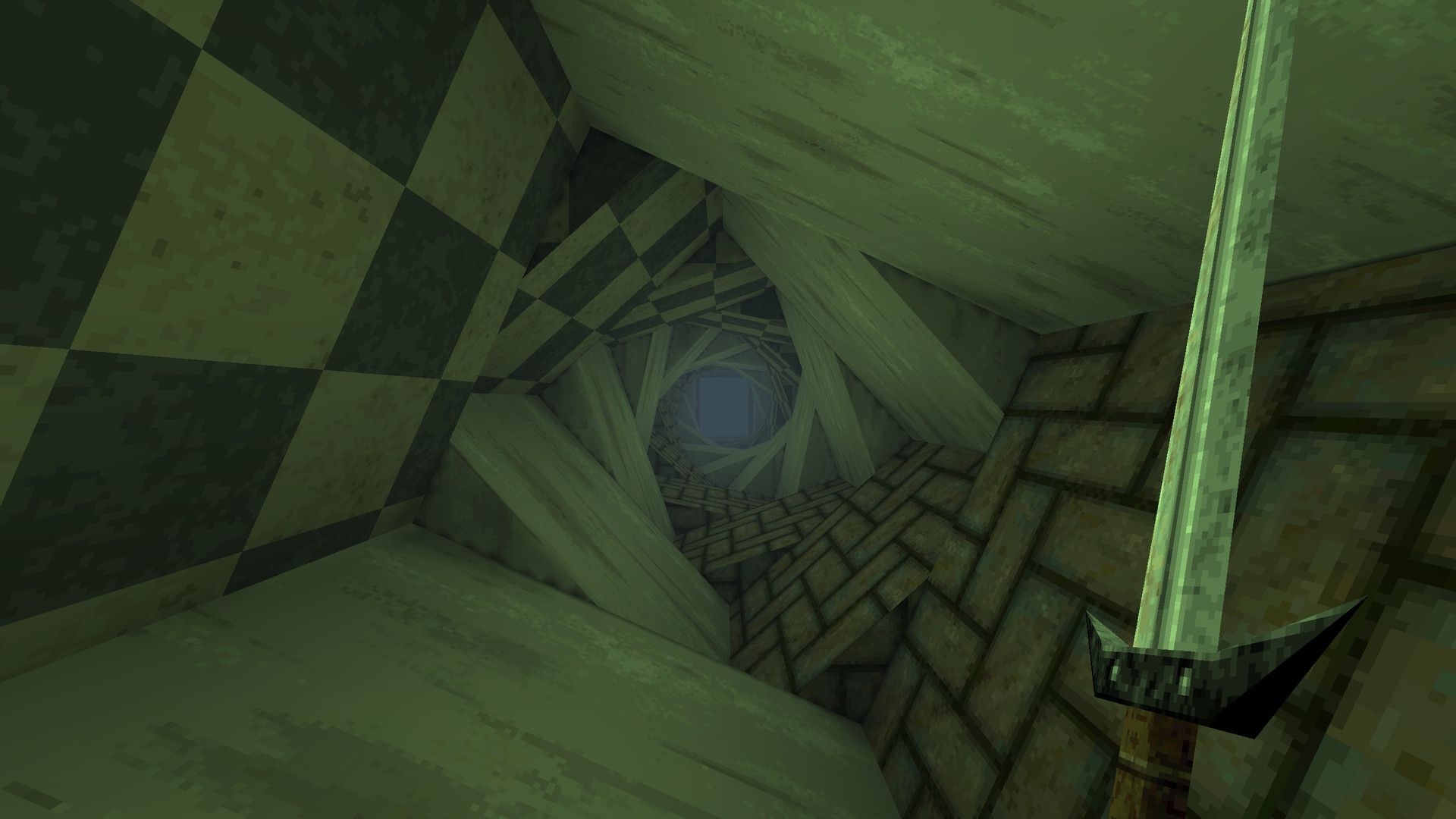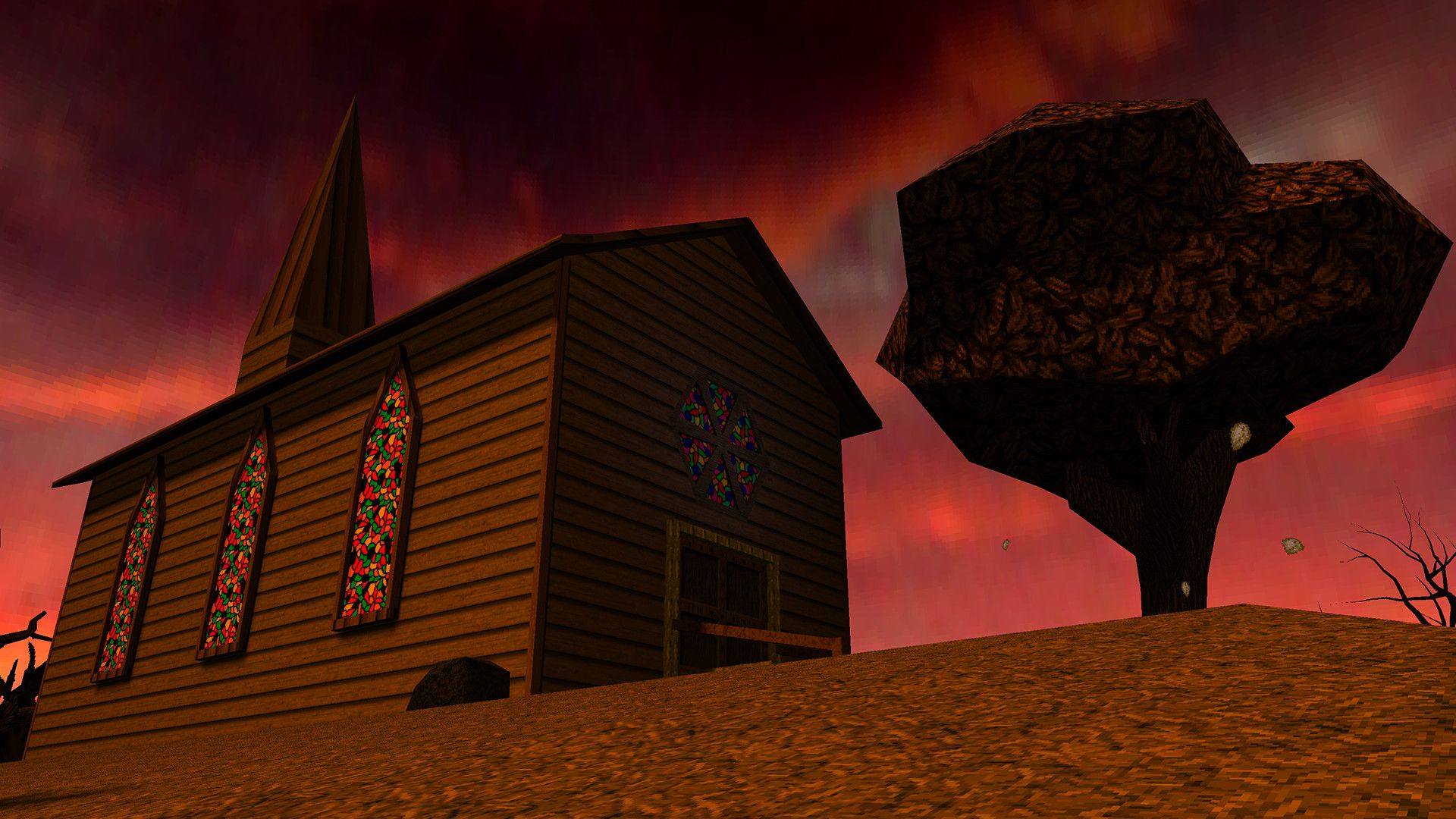On a surface level, DUSK might not seem like it would be that deep or intricate. A throwback shooter cut from the mold of id Software classics like Quake, developer David Szymanski has crafted something that gets under your skin and just won't leave. You start to dream of its corridors, its music, its theming: there's just so much going on.
How did the team over at publisher New Blood Interactive come up with these concepts? Was there anything left on the cutting room floor? Are there concepts that never got pushed about an initial idea? In this second part of a massive DUSK interview, we'll be looking at the creation of specific levels and the ideas that helped lay the foundation for the masterpiece we have today.
Due to how long this piece would be otherwise, it will be presented in a traditional Q&A format. Many thanks to David Szymanski, Dave Oshry, and Andrew Hulshult for talking to me.
TheGamer: David, I know you've made some jokes about Doom's E3M9 (something to the effect of, "Warrens? It's great! We'll just copy the same level!), so I was wondering if DUSK's E3M8 was inspired by that?
Dave Oshry: Yeah, it's like a "Welcome Back." The coolest part of that level, though, is how Andrew remixed the old music into a new track. They're basically all there.
Andrew Hulshult: Essentially, it sounds like what all of the levels are supposed to be. I actually played through it a ton of times to try and time how it would come out. I've seen a few streams where people get the timing just right. I smile and say, "Yeah, that's how it's supposed to go."
TG: I was wondering if that level was trying to take the concept of Warrens, but not cheap out on it (putting aside how Doom was created nearly 30 years ago).
David Szymanski: I really liked the idea of it being a formal thing. It's the idea of the game forming something of a circle. You kind of end where you began and something new starts. It doesn't necessarily have plot significance, but it just seemed right to do and so I thought it would be cool. I wanted the player to start thinking, "Wait, didn't I just do this," but then it becomes twisted in different ways.
It mirrors us designing the game, in where we were constantly trying to up the ante. Now, it's the actual game progression itself messing with your head instead of just outlandish level design ideas.
TG: I noticed that, actually. When playing back through it, everything about DUSK is good, but the first episode almost feels basic in comparison.
Szymanski: I was also learning level design as I went. At the end of the day, the beginning is very basic. It’s not nearly up to the standards of the future levels. There is probably some stuff that should have been more adorned than it was. But, I was just learning level design and also learning what the game was.
It wasn't until episode two that I think all of us kind of understood what DUSK was going to be, plot-wise, gameplay-wise, everything. Episode one was mostly rural Quake. As it went on and all of the crazier stuff started getting introduced, then we started to build the game sequentially. At first, we had very little variation, but as we went from the first level to the last in an episode, it helped us form more cohesion in design.
Oshry: That's how I like to build levels: front to back. I didn't want to play anything out of order. I said to the team, "I'll play E3M4 when you're done with E3M3," and stuff like that. I think of games as an experience from the second you boot it up right until the credits roll. I want to control that flow and narrative and make sure it's as good as possible. The way I do that is literally "level by level, brick by brick." That's our design mantra.
TG: That's interesting, but it also makes me think of the music for DUSK. Andrew, how early into the production of DUSK were you involved?
Hulshult: I joined right at the beginning of what became DUSK. I was brought on whenever it started to materialize into what shipped. I joined right before Episode One was even put together. Dave had reached out to me and I took the chance because to be perfectly honest, I was at a point in my career where I was thinking, "Fuck this."
I was kind of done with my past experiences. I was just getting more frustrated as time went on that I couldn't find a project like DUSK where I could have a ton of input. So, to have that experience come to me: it was refreshing. It turned out to be a really fun development cycle, too. Everybody got to reap the benefits afterward.
TG: That segues perfectly into my next question. When you were writing the score, did you compose it alongside levels, or beforehand?
Hulshult: It was a little bit of everything. David would tell me certain things very early on about what he was looking for and I would try to write around that. I would hand them stuff and have Dave correct me if anything was wrong because lord knows I was drinking an ass load during all of this.
Szymanski: Haha. Sometimes, it would be that I'd do a level and you'd get the rough draft to do music for it. Other times, I would be in the middle of a level and say, "Here's what I'm thinking." Mostly, the levels informed the music and the music informed the levels.
Oshry: There was also a lot of stingers and stuff. When I'd go through and play, I'd be like, "Oh man! It would be really cool if we had a stinger here, or a little moment here, or the music changed here." Andrew would either say "Yeah!" or grumble "UGH! I've already made so many stingers. Just reuse them!"
Hulshult: That's the fucking truth. There are so many in there, haha. Really, a lot of this back and forth started a bond between me and David. I didn't know David very well. When I came on, it was mostly, "Hey, you're working with this guy. He's kind of quiet. He's really nice. He definitely knows what the fuck he's doing." His being really into the same types of games I was into, just helped us get to know each other better.
Oshry: I was watching a video on South Park, part of that Six Days to Air thing. During it, people would say, "Doesn't Trey just kind of do everything?" Both Matt and Trey would say, "No. We need everyone else because that's the band. It doesn't work without that." I get the same feeling with DUSK. Without any one of us, it's not the game. I'm the drummer, David's the piano player, and Andrew plays guitar and bass… and everything else.
Hulshult: Just to wrap this all up: We all had ideas. We all pitched into them. My job as the composer was to not disappoint David. He already had ideas for the music, so I didn't want to let him down. I wanted to be able to make sure I could write music that he was happy with as much as I was. I did that by simply telling him I would write music I'm happy with and he said, "Yeah. That sounds great." It went smoothly from there.
TG: Getting back to level design, I wanted to talk more about the flooded church, which I believe is E3M3. That's one of my favorite levels in the game.
Szymanski: That's one of the more complex levels in the game as far as geometry and interlocking systems go. It took forever to make. It's one of the few that's up to Quake boomer standards.
TG: I'm curious what made you go for that concept. In modern discourse, people talk about how they hate underwater levels. With this, though, you created something special. What made you go for it?
Szymanski: I don't exactly remember. I think it was more a case of, "How can I?" How can I do something crazy and unique with this level that's going to feel like advancing on everything that came before? I think the very original idea for the level, which isn't in the final version, is that it was supposed to take place in layers. You would have started out at the lowest part of the city, then gotten the climbing power up and that would grant you access to the middle portion.
After that, the water would come in and you'd be able to go anywhere. It would have progressed to the point where gravity isn't a concern, but that didn't end up in the final game. In essence, we trimmed it down to first letting you into the complicated city, then you get to swim around. Then it ends on the Chomper boss.
TG: That's another interesting aspect of DUSK. You can skip all of the boss battles. That's one of my favorite aspects. Did your love for immersive sims inform that?
Szymanski: No. The desire for having skippable bosses was the fact that I hate boss battles.
TG: That seems to be a thing in boomer shooters, and shooters in general. The boss fights tend to not be that good. I wonder why.
Szymanski: I don't know. As I said, I don't like boss fights, so I don't even know what makes one good. That's part of the reason why the bosses in DUSK are basic.
Oshry: Speaking on a different game of ours, Hakita (the dev behind Ultrakill) always gets asked why Ultrakill has such cool boss fights and he says, "It's because they're not FPS boss battles." Those fights are character action boss fights. He just thinks in a way that we don't when it comes to that stuff. We're doing stuff like Wolf 3D and Doom, where you just shoot the thing until it fucking dies.
Gah, boss battles suck, haha. Some people are just really good at them and others aren't. Hakita has the gift there while David doesn't.
TG: If you did boss fights like Ultrakill has in DUSK, it wouldn't make much sense.
Oshry: No, but I think if we were to expand anything for DUSK, we could come up with some cooler boss stuff. We would use all of the lessons we've learned thus far.
TG: Winding back a little, I wanted to bring up the Escher Labs.
Szymanski: Yeah, everyone loves those. Just rip off Thief. It's fine.
TG: Haha. Was Thief the original inspiration for that?
Szymanski: No, the original inspiration was just a laboratory. Since I didn't know how to make it interesting, I figured I would just make it insane. Once that was on the table, I drew a bunch of inspiration from the mission "Constantine's Mansion." The spiral tunnel, for instance.
Oshry: I remember when I was first playing through it and I said, "Oh, it's the Thief tunnel." He said, "Good. I'm glad you got that." I figured that if anybody doesn't get that reference, they probably shouldn't be playing our games.
TG: Escher Labs makes me think of what you just said about Episode Three. There are multiple layers to it. It starts off normal, becomes slightly distorted, then goes full-on crazy.
Szymanski: If I remember correctly, the level started off from a rough idea. It was a very basic, boring looking hallway where walls would just keep coming down. Eventually, it would open up into this giant complex. You'd come upon what the Escher Labs is now.
Oshry: The original ending changed so much. When we started, there wasn't even Mama and the Twins. You were originally looking for an item and there was supposed to be an operating table. There would have been no boss on it, but you'd enter a big surgical room, something like that.
I'm not sure how we ended up with the final room we got, but it turned out really cool. I remember asking if you could bring home the fact that there was some kind of gravity device and if you could have chairs floating in the air and shit.
TG: A lot of the design of DUSK and other New Blood titles is very signposted, but not in an obvious way. That's something I appreciate.
Oshry: Yeah, that's actually a part of the Escher Labs. When you get to the mama fight, I wanted to do something like the Indiana Jones invisible bridge. David wasn't sure if people would get it, but we looked at which items would bounce or not, and then I had him put some mortar ammo near the bridge to clue players in.
Szymanski: I'm surprised people got through that because it seems really cryptic to me.
Oshry: That's certainly the first thing I thought, but I'm also old. What I've found through producing games is that you can only do so much. In newer games, you'd have a ton of exposition or a giant fucking arrow and they'd take the camera and zoom right in. We don't do that because we use what we have. So for DUSK, all we can do is either give you health, weapons, items or write some shit on the wall.
Szymanski: And we do all of those.
Oshry: Yeah, I’m very big on writing shit on the wall, especially because you can get away with it if it's funny. In one section, I wanted people to save there, so I said, "Write something like 'Save Me' or 'Save Us.'"
Szymanski: I figured no one would get that, but they totally do.
Oshry: Exactly. You put that bug in their brain and give them an item, and they'll usually figure it out. When I walk away after watching people play our games, that's the one thing I've realized. It's not something they even teach you in fucking game producer school, which I didn't go to anyway. You just have to learn this shit by watching people play your games. That's what led me to believe giving the player more ammo would lead them to the Indiana Jones moment.
TG: Thinking about that, how do you balance the different difficulty options for DUSK?
Szymanski: Dave is how we, basically, balance the difficulty. As I was making a level, I would make it so that it feels pretty reasonable for me to play through it. I figure I'd add a little bit more health and ammo and then iterate on that through some internal playtesting. After that, we'd get people's feedback, though that is often frustrating.
Oshry: I'm the baseline, right? We have this thing that goes, "If Dave can beat it, anybody can beat it," because I'm very middle of the road and a very average gamer. What I do is play all of our games doing pistol start on each level, even in Amid Evil and Ultrakill, and I feel out whether we've got enough ammo, health, armor pickups, and enemy encounters. If they feel good, then that's what medium difficulty is.
I don't playtest on anything else. I let the player decide whether they consider anything harder or easier. Our games are balanced for the normal difficulty and I've found that for most people, that is fine. If you have players telling you the game is too easy or too hard, then you've probably ended up with something that is just about right.
Recently, I was at Quakecon playing through a pre-release of Golden Souls Three and I was running around the whole level with one health. I said to Batandy (creator of the mod), "There are no health pickups anywhere." He didn't even think of that because he's used to super Doomers that don't get hit or die, but it created something that was really hard. A lot of times with older shooters, you see people getting frustrated not because of bad level designs, but because the encounters aren't balanced.
You can do a lot with just a little bit of health, a little bit of armor, a few more weapons, even if they are hidden secrets. The idea should be, "Can I live?" That's where the balancing is. When you die, you want it to feel like you fucked up instead of the game saying, "Fuck you, fuck you! I'm Sigil!"
One of the reasons DUSK has been so successful is because it's very accessible. With a lot of these other retro shooters, the designers want you to get good. For me, I believe you can always turn up the difficulty. There's never any discourse on Twitter about a game being too easy. I would rather our games be too easy because then nobody is going to quit and leave a negative review and ask for a refund.

